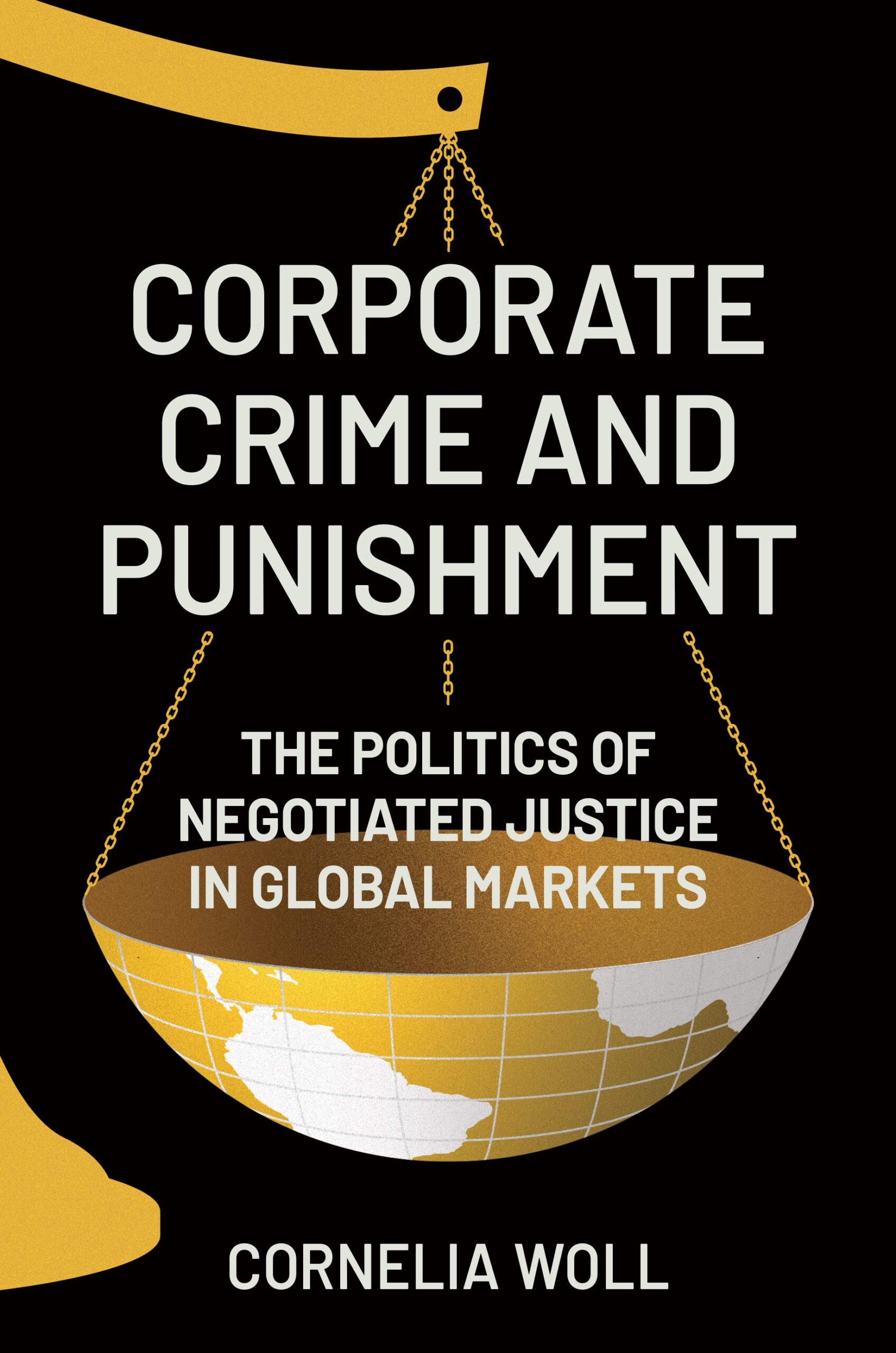Ask any corporate criminal prosecutor or former prosecutor turned defense attorney practicing in the United States whether political considerations ever enter into a prosecution of a major multinational corporation and the answer is almost universally – no, never.
It’s just the facts and the law.
Cornelia Woll is not a lawyer. She is a professor of International Political Economy at the Hertie School in Berlin. She is also President of the Hertie School.
And she has a different view, which can be discerned from the titles of her most recent writings, including an article titled – The Political Economy of Law Enforcement – and her most recent book – Corporate Crime and Punishment: The Politics of Negotiated Justice in Global Markets (Princeton University Press, 2024).
How did you become interested in this field of corporate crime?
“I wrote my previous book on the financial crisis and in particular on the bank bailouts in six different countries,” Woll told Corporate Crime Reporter in an interview last week. “I compared how the financial industry negotiated with the governments on how they needed to be saved through different measures.”
“I was quite struck by the judicial aftermath of the financial crisis. It was weaker than could be expected. No one went to jail for some of the financial fraud. I became interested in corporate crime and also the different regimes for corporate liability. I then became more broadly interested in corporate criminality in general and how corporate liability was enforced across countries.”
“And that led me to an in-depth study that started with the United States. The U.S. was a driving force of what I considered regime change across countries in the last two decades. But this is a comparative book. And I am looking at global markets. I’m looking at how different instruments spread from the United States to Europe, to Asia and to Latin America. And that’s the story of this book.”
What do you mean by regime change?
“In many countries, corporate criminal liability didn’t exist. Criminal liability lies with the individuals. The idea that a corporation can be liable as an organization, the way in which you try to conduct an investigation in a complex organization and the ways in which you incentivize these investigations – these have in part been inspired by what has been used in the United States.”
“What I call regime change is a change from a setting where corporate malfeasance is tried when individuals are brought to trial to what I call negotiated justice where you try to incentivize corporations to cooperate with an investigation and most of the time reach a settlement where they pay a fine, where a monitor is appointed. But there is no longer a trial in court with a prison sentence.”
Are you saying this is a power play by powerful American multinational corporations to change the law to their favor?
“It is also something that the Department of Justice is driving in order to get into complex organizations, in order to be able to investigate cases that they might not have had access to.”
“Over the last twenty years, there is a trend in corporate crime to move toward deferred prosecution agreements that are in the interests of prosecutors. They can bring a case and investigate it. And possibly it’s in the interest of large corporations because they might be able to negotiate a result that is better than if they had been tried in court.”
Over the years we have documented what we call the corporate crime lobby – powerful corporations with their elite law firms – pushing this agenda of deferred and non prosecution agreements. Prosecutors in effect let the corporations off the hook and in exchange sometimes throw lower level executives under the bus to be criminally prosecuted.
“It’s an interesting development and I’m interested in variations of that across countries as well,” Woll said. “There is a reason to move toward deferred prosecution agreements that are also in the interest of not just the prosecutors, but in the interest of the victims as well.”
“I remember quite clearly a case in France involving housing fraud. I made the argument that it was outrageous that a company could pay their way out of fraud. And one of the victims said – but at least they could bring a case that previously was unthinkable and they could get closure on it. And that’s important as well.”
“I agree with what you described as the agenda of the corporate crime lobby. But why it went so far is because it’s in the interest of bringing complicated cases in complex settings, in particular ones that cross borders with very mobile organizations such as corporations.”
“I’m interested in finding out how to make deferred prosecution agreements function better.”
“When you defer a prosecution, are you able to have something with teeth, if the corporation is repeating the same fraud again – in recidivism cases?”
“Is there equity in the deferred prosecution agreement across cases? Is a judge overseeing what is being negotiated?”
The corporations in the United States who are pushing their agenda seem to have won their battle. What we have reported on recently is a decline in major corporate crime prosecutions over recent years.
What we are seeing instead is an increase in prosecutions of non-U.S. based multinationals. In your book, you crunched some of those numbers also.
“Yes, we found the same thing. At one point, I suggest that going after foreign corporations might be a fig leaf for U.S. prosecutors to hide the fact that they are no longer able or willing to go after powerful U.S. based multinationals.”
“We looked at the Corporate Prosecution Registry at the University of Virginia Law School. And we see the prosecutions brought at the federal level, including settlements. The great majority are U.S. cases, as one would expect.”
“Over 83 percent of the cases are U.S. based companies. But we also see that the majority of the fines being paid in these cases come from the foreign companies. Only 17 percent of the cases account for almost 60 percent of the fines that are being paid.”
“That’s just an observation. I ask how come these foreign companies are paying so much.”
“It’s possible because they are the bigger criminals. It’s also quite difficult to go after a foreign company, so you only go after major cases. There is a selection bias.”
“De facto, the U.S. Department of Justice has become the global police of the markets. And second, it’s true that it’s possibly politically easier to go after companies that are abroad because you are not in any way responsible for the employment or the impact on the prosperity of the region where that company is based, if it has to pay heavy penalties.”
“There is a bias that at least merits some explanation.”
It’s not just the fines being higher. They are bringing a disproportionate number of cases against foreign companies.
“In some countries, you can only use deferred prosecution agreements when there is no bodily harm or serious misconduct. You can only use them in certain kinds of cases.”
“The foreign Justice Departments are realizing that if they don’t negotiate with their companies, the United States Justice Department will. And there were a lot of cases where European banks or energy companies had to pay very heavy penalties for export violations to the United States – one company paid $9 billion. The governments felt that this was taking their sovereignty away over their own country’s corporations. And they couldn’t act if the United States government was acting. But if they negotiated as well, they could negotiate jointly with the United States.”
“That’s why many of these countries changed their laws and now they negotiate with the Department of Justice.”
You wrote an article titled The Political Economy of Law Enforcement. That article was a precursor to this book?
“They happened in tandem. We asked – what cases are not being followed up on? I see that there is a lot of corporate criminality that is not being investigated. I’m concerned about the selectivity of picking some cases and not picking others. It’s very hard to put a finger on that selectivity, because you would have to know all of the cases that have not been investigated or prosecuted.”
Major corporate crime cases where people die as a result of the crime are being settled with these negotiated settlements. Columbia Law Professor John Coffee called the Boeing deferred prosecution agreement one of the worst ever. Aren’t they inherently a bad idea?
“Well, let me put it this way. In many civil law countries, any negotiation in these cases is looked down upon and frowned upon. Negotiation is always open to power dynamics. The bigger and richer win over the weaker parties. In civil law counties, you do not accept even the idea of a plea deal. You have to investigate and bring a case with the judge overseeing the case – and you don’t strike deals.”
“That is becoming watered down, simply because of the incentives to strike deals. The downsides of what is happening in the United States are visible and known. But the fact of the matter is absent that negotiated settlement approach, foreign governments don’t go after their foreign corporations either. And that’s because the companies are important to the economy because they employ many people, because they might be a source of national pride or they provide infrastructure.”
“In the 1980s and 1990s, the history of most of these countries is that corporations were outside the reach of law because the law was domestic and a company that was threatened with prosecution would just move their activities abroad to a different legal setting and get away with it.”
“Today, we are in an interconnected global economy where companies, no matter where their activity is and who they are dealing with, will be able to be prosecuted by the Department of Justice in the United States. Something will happen and it will be according to the rule book of the United States. And the foreign governments say – if we decide that we don’t want to be part of this game, it will happen without us. And our companies will pay considerable sums of money. That money will go into the U.S. Treasury and not into our treasuries.”
“They are part of a system that they don’t necessarily think is a good one, but it is the lesser of two evils.”
“We are not in a good space in corporate liability.”
“But just to reiterate, in countries outside the United States, you couldn’t satisfactorily bring cases against big multinational companies because they would just move out of your jurisdiction. For the United States, that might not seem like a big issue because the market there is so big that it doesn’t happen a lot.”
“I don’t think we are in the right spot. In the United States, there are certain things you can tweak to make the system better. I see no reason to ever give a non prosecution agreement to any company. If there is something at the heart of the accusation, you can defer prosecution and give them time to clean up their act. But why would you not prosecute?”
“If you have a recidivist, then you must go to court to prosecute. I think there was a report from Public Citizen in the United States showing very few corporate recidivists being prosecuted.”
“Most of the time, when you have a deferred prosecution agreement and the company commits another crime they just get another deferred prosecution agreement. That’s a problem as well.”
“Also, you should never sideline judges altogether. Judges should look at all of the agreements being negotiated.”
[For the complete q/a format Interview with Cornelia Woll, see 38 Corporate Crime Reporter 4(13), January 15, 2024, print edition only.]

